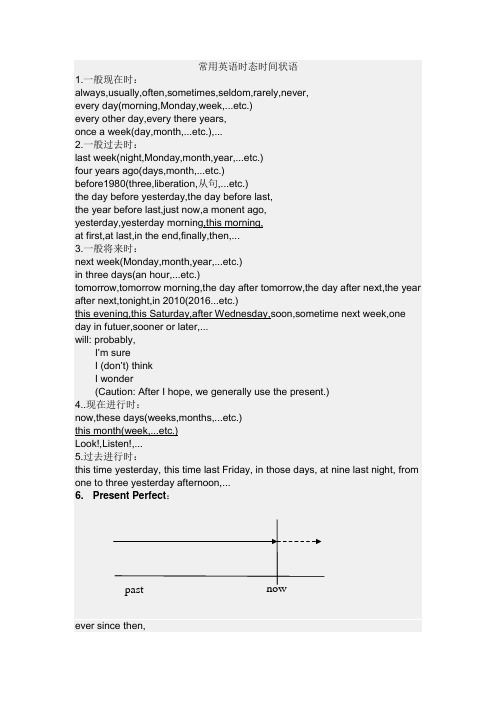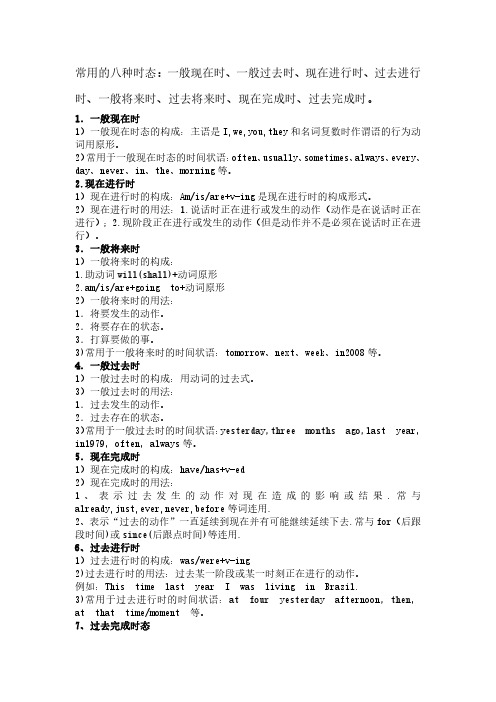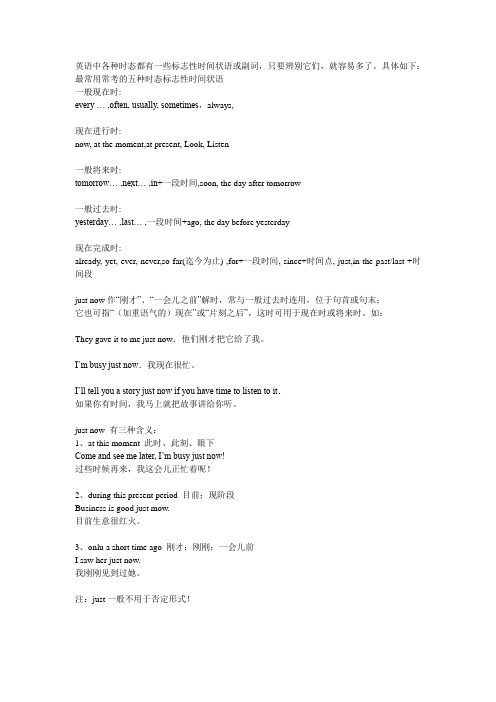各种时态常用的时间状语 Name
各时态常用时间状语总结

各时态常用时间状语总结常用时间状语有:1.每天/周/月/小时/十分钟,每隔一天/两天/几天。
2.早上/下午/晚上,在晚上。
3.每周一次,每年两次。
4.经常,通常,频繁地,总是,有时,偶尔,从不,很少。
5.在每个星期天。
6.现在,目前,暂时,现在就,总是。
现在进行时常用时间状语:1.现在,此刻,目前,暂时。
2.总是。
现在完成时常用时间状语:1.for + 一段时间,since + 点时间,如ever since,since then。
2.在过去的30年里,在过去。
3.最近,刚刚,这些日子。
4.到目前为止,直到现在。
5.肯定的ever,否定的never。
6.肯定的already,否定的yet。
一般过去时常用时间状语:1.一般现在时的时间状语+一个过去的时间,如every day last year,on Sundays last year。
Yesterday。
just now。
and the other day are all examples of time XXX。
phrases like last year。
last night。
and last month refer to specific points in the past。
When using time clauses introduced by when。
XXX is often used to describe an n that was in progress when another n occurred。
For example。
"I was watching TV when he came in." It is XXX present continuous tense。
it XXX n in the present.The past perfect tense is used to XXX before another past n。
英语中的时间状语

英语中常用的时间状语有以下几种:1. 一般现在时:表示现在的习惯、事实或一般情况。
如:I study English every day.(我每天学英语。
)2. 一般过去时:表示过去某个特定时间发生的动作或存在的状态。
如:I studied English yesterday.(我昨天学英语了。
)3. 一般将来时:表示将来某个时间会发生的动作或存在的状态。
如:I will study English tomorrow.(我明天会学英语。
)4. 现在进行时:表示现在正在进行的动作。
如:I am studying English now.(我现在正在学英语。
)5. 过去进行时:表示过去某个特定时间正在进行的动作。
如:I was studying English at 8 o'clock last night.(昨天晚上八点我正在学英语。
)6. 将来进行时:表示将来某个特定时间将要进行的动作。
如:I will be studying English at 8 o'clock tomorrow.(明天早上八点我将要学英语。
)7. 现在完成时:表示过去发生的动作对现在造成的影响或结果。
如:I have studied English.(我已经学过英语了。
)8. 过去完成时:表示过去某个时间点之前已经完成的动作。
如:I had studied English beforeI went to college.(我上大学之前已经学过英语了。
)9. 将来完成时:表示将来某个时间点之前将要完成的动作。
如:I will have studied English by the time I graduate.(我在毕业时已经学过英语了。
)10. 现在完成进行时:表示从过去某个时间开始一直持续到现在并仍在进行的动作。
如:I have been studying English for 3 years.(我已经学了三年英语了。
常用英语时态时间状语

just, already, yetjust: “Are you hungry?”“No, I have just had lunch”Hello, have you just arrived?already: “Don’t forget to pay your electricity bill.”“I have already paid it.”“What time is Mark leaving?”“He has already left.”yet: Has it stopped raining yet?I’ve written the email, but I haven’t sent it yet.never, ever, now, before:Have you ever eaten caviar?What a boring film, it’s the most boring film I have ever seen.He has never driven a car before.recently: Have you heard anything from Brian recently?in the last few days: I’ve met a lot of people in the last few days.so far: Everything is going well. We haven’t had any problems so far.since then(1949, last Monday, two o'clock, 从句...,etc.): I’m hungry. I haven’t eaten anything since breakfast. (=from breakfast until now)for three days(a long time, two hours,...etc.): It’s good to see you again, We haven’t seen each other for a long time.today, this evening, this week, this term, these days, this year…today: I’ve drunk four cups of coffee today.this morning: I haven’t seen Tom this morning. Have you?this year: Have you had a holiday this year?this term: Rob hasn’t worked very hard this term.once, twice, three times:It’s the first time he has driven a carSarah has lost her passport again, it’s the second time this had happened. 7.过去完成时:by then(1977,yesterday,eight last night,the time we got there,...etc.)by the end of last term(week,year,month,...etc.)有些时间状语可用在不同的时态中,各有其意:now:1)I am speaking English now.2)We have finished our homework now.3)He's in the classroom now.this afternoon:1)We had a class meeting this afternoon.2)We're going to see a film this afternoon.today:1)I've got two letters today.2)We will learn a new lesson today.3)She's cleaning her room today.after seven:1)Mary will wash her clothes after seven.2)Mary washed her clothes after seven.for a week:1)John stayed in Wuxi for a week.2)John has stayed in Wuxi for a week.3)John will stay in Wuxi for a week.除之外,过去将来时主要用于宾语从句(主句为过去时);故事;小说中等表过去的打算。
(完整版)各时态常用时间状语总结

各时态常用时间状语一般现在时1 every day/week/month/hour/ten minutes,every other day(每隔一天)=every second day=every two days;every three days(第三天,即每隔两天),every few days2 in the morning/afternoon/evening, at night3 once a week, twice a year…4 often, usually, frequently, always(也会出现于现在进行时,表示过于频繁), sometimes, at times(时不时), from time to time, every now and then(时不时), frequently, once in a while(时不时) never(它也会出现于现在完成时),seldom(很少),hardly5 on Sundays(=every Sunday)6 right now(此刻, 目前)现在进行时:now, at the moment, at present, for the time being(现在)right now(此刻, 目前)(也可用于一般现在时)always(表示过于频繁发生)现在完成时:1 for + 段时间(可用于各种时态), since+点时间(表示段时间)(ever since, since then)(注意这两个时间状语要求句中谓语动词是可延续性的)2 in/over the past 30 years(注意只用in the past是一般过去时)3 lately, recently, just (刚刚), these days(根据情况有时也可用于一般现在时)4 so far, by now, up to now; up until now(直到现在)5 ever(肯,疑); never(否);6 already(肯); yet(否,疑)一般过去时:1 现在+过去,(即一般现在时的时间状语+一个过去的时间,如every day last year, on Sundays last year)2 yesterday, ...ago, just now(刚才), the other day(前几天)3 last year/night/month...4 in the past5 由when 引起的时间状语从句中.(I was watching TV when he came in)(见后常用句型)过去进行时:1 一点时间+过去(3 o'clock yesterday; this time last month)2 由when 引起的句中.(I was watching TV when he came in)(见后常用句型)3 参照上下文4 while两端都用进行时过去完成时:1 by + 过去一点时间(by the end of last year)2 Hardly...when; no sooner...than...(否定句部分)(见后常用句型)一般将来时1 soon, tomorrow, this evening, tonight2 in+段时间, after+点时间3 in the future4 next year/month/week/morning/Sunday...5 right now(立刻,马上)(注意与现在进行时的意义上的区别)将来进行时一点时间+将来(3 o'clock tomorrow; this time next month)将来完成时by +一点时间(by the end of next year)过去将来主要用于虚拟和宾语从句,从时间上讲还是过去常用句型:When(3)was/were doing when didhad done when didwas/were about to do when did(无时间状语)(was/were going to do when did)since(2)it is …since didit was …since had doneno sooner…than; hardly/scarcely…when(否定部分倒装,过完,than, when一般过,不倒)No sooner…than : 否定后倒装+过完, than, when后一般过,不倒装Hardly…when主将从现(主情从现,主祈从现)(状从主将从现)If(如果), until, unlesswhen, once, beforeas soon as, the moment, every time, by the time immediately, directly, instantlygo,come,arrive,run(用光),leave,finish, take...: 进表将,现表进all the time进行时。
最常用的几种时态与时间状语的搭配

最常⽤的⼏种时态与时间状语的搭配初中英语时态讲解与专练⼀、⼀般现在时1.表⽰经常习惯的动作(频率词)It often snows here. He gets up at 6 every day.2.表⽰主语现在的特征或状态He loves sports. We are in the same class.3.表⽰永恒不变的真理和事实或格⾔警句Knowledge is power. The sun rises in the east.特殊⽤法:1.按计划(时间表/时刻表/⽇程表)将要发⽣,句中有时有将来的时间状语,但不⽤将来时,要⽤⼀般现在时1.Look at the timetable. Hurry up! Flight 4026 _____ off at 8:20. (06四川)A. takesB. tookC. will be takenD. has taken2.The train ______ at three this afternoon.(leave)2.状语从句“主将从现”…时间、条件、⽅式、让步状语从句中⽤现在时表⽰将来“主将从现” if/when/until/as soon as/though...⼆、⼀般过去时1.表在过去发⽣的和现在没有联系的动作或状态明⽰:yesterday, ago, last …, just now, in 1990暗⽰:when I was a little girl, when he put on his coat2.描述过去的情况⾔外之意:只有过去如此现在并⾮如此Edward, you play so well. But I __ you played the piano. (2009全国I) (A)A. didn't knowB. hadn't knownC. don't knowD. haven't known三、⼀般将来时1.表⽰将要发⽣的动作或存在的状态I’ll return you the book next week. She’ll be twenty years old next year.2.表⽰⼀种倾向或习惯动作②be going to do(客观计划)注意:be about to do(即将/马上要做某事)1) be going to 表⽰即将发⽣的或最近打算进⾏的事情,⽽will表⽰谈话时临时决定的意图,具有临时性和偶然性。
英语常用的八种时态

常用的八种时态:一般现在时、一般过去时、现在进行时、过去进行时、一般将来时、过去将来时、现在完成时、过去完成时。
1.一般现在时1)一般现在时态的构成:主语是I,we,you,they和名词复数时作谓语的行为动词用原形。
2)常用于一般现在时态的时间状语:often、usually、sometimes、always、every、day、never、in、the、morning等。
2.现在进行时1)现在进行时的构成:Am/is/are+v-ing是现在进行时的构成形式。
2)现在进行时的用法:1.说话时正在进行或发生的动作(动作是在说话时正在进行);2.现阶段正在进行或发生的动作(但是动作并不是必须在说话时正在进行)。
3.一般将来时1)一般将来时的构成:1.助动词will(shall)+动词原形2.am/is/are+going to+动词原形2)一般将来时的用法:1.将要发生的动作。
2.将要存在的状态。
3.打算要做的事。
3)常用于一般将来时的时间状语:tomorrow、next、week、in2008等。
4.一般过去时1)一般过去时的构成:用动词的过去式。
3)一般过去时的用法:1.过去发生的动作。
2.过去存在的状态。
3)常用于一般过去时的时间状语:yesterday,three months ago,last year,in1979,often,always等。
5.现在完成时1)现在完成时的构成:have/has+v-ed2)现在完成时的用法:1、表示过去发生的动作对现在造成的影响或结果.常与already,just,ever,never,before等词连用.2、表示“过去的动作”一直延续到现在并有可能继续延续下去.常与for(后跟段时间)或since(后跟点时间)等连用.6、过去进行时1)过去进行时的构成:was/were+v-ing2)过去进行时的用法:过去某一阶段或某一时刻正在进行的动作。
例如:This time last year I was living in Brazil.3)常用于过去进行时的时间状语:at four yesterday afternoon,then,at that time/moment等。
时态标志性时间状语或副词

英语中各种时态都有一些标志性时间状语或副词,只要辨别它们,就容易多了。
具体如下:最常用常考的五种时态标志性时间状语一般现在时:every … ,often, usually, sometimes,always,现在进行时:now, at the moment,at present, Look, Listen一般将来时:tomorrow… ,next… ,in+一段时间,soon, the day after tomorrow一般过去时:yesterday… ,last… ,一段时间+ago, the day before yesterday现在完成时:already, yet, ever, never,so far(迄今为止) ,for+一段时间, since+时间点, just,in the past/last +时间段just now作“刚才”、“一会儿之前”解时,常与一般过去时连用,位于句首或句末;它也可指“(加重语气的)现在”或“片刻之后”,这时可用于现在时或将来时。
如:They gave it to me just now.他们刚才把它给了我。
I’m busy just now.我现在很忙。
I’ll tell you a story just now if you have time to listen to it.如果你有时间,我马上就把故事讲给你听。
just now 有三种含义:1、at this moment 此时、此刻、眼下Come and see me later, I’m busy just now!过些时候再来,我这会儿正忙着呢!2、during this present period 目前;现阶段Business is good just mow.目前生意很红火。
3、onlu a short time ago 刚才;刚刚;一会儿前I saw her just now.我刚刚见到过她。
初中的六大时态的时间状语

初中的六大时态的时间状语一、一般现在时时间状语:每天每天,我们都会面对各种各样的事情。
早上,我们起床,开始新的一天。
我们会洗漱、穿衣、吃早饭,然后出门上学。
在学校里,我们会上各种课,学习各种知识。
有数学、语文、英语等等。
每天,我们都会认真听讲,做好笔记,积极参与课堂讨论。
下午放学后,我们会回家做作业,复习今天学过的内容。
然后,我们会有一些休息时间,可以做自己喜欢的事情,比如看书、听音乐、做运动等等。
晚上,我们会吃晚饭,和家人一起聊天,分享一天的经历。
然后,我们会做一些自习,为第二天的学习做准备。
最后,我们洗漱完毕,上床睡觉,准备迎接新的一天。
二、一般过去时时间状语:昨天昨天,我和我的朋友们一起去了动物园。
我们早早地来到了动物园门口,买了门票进去。
一进去,我们就看到了各种各样的动物。
有大象、长颈鹿、狮子、老虎等等。
我们观察了它们的生活习性,还拍了很多照片。
然后,我们去了海洋馆,看到了各种各样的海洋生物。
有鱼、海豚、海龟等等。
我们还参观了动物园里的表演,看到了狗熊表演、海豚表演等等。
整个一天下来,我们玩得非常开心,收获了很多快乐的回忆。
三、现在进行时时间状语:现在现在,我正在写作业。
我坐在书桌前,专心致志地完成每一道题目。
我正在用笔仔细地画图、写字。
同时,音乐正在播放,给我带来了一些放松和愉悦。
我的思绪正在跳跃,我正在思考如何更好地解决问题。
周围的环境非常安静,只有键盘敲击声和纸张翻动声。
我正在全力以赴地投入到这个任务中,希望能够取得好的成绩。
四、过去进行时时间状语:昨天下午昨天下午,我正在和我的好朋友们一起打篮球。
我们来到了篮球场,穿上球鞋,开始热身。
我正在跑步、做拉伸动作,准备迎接紧张的比赛。
比赛开始了,我们正在全力以赴地奔跑、投篮、防守。
汗水正在不断地流淌,但我们没有停下来,一直坚持到比赛结束。
尽管最后我们输了,但我们并不气馁,因为我们知道,只要努力,下一次一定会取得更好的成绩。
五、一般将来时时间状语:明天明天,我将去参加一场音乐比赛。
- 1、下载文档前请自行甄别文档内容的完整性,平台不提供额外的编辑、内容补充、找答案等附加服务。
- 2、"仅部分预览"的文档,不可在线预览部分如存在完整性等问题,可反馈申请退款(可完整预览的文档不适用该条件!)。
- 3、如文档侵犯您的权益,请联系客服反馈,我们会尽快为您处理(人工客服工作时间:9:00-18:30)。
各种时态常用的时间状语Name______一、一般现在时态常用的时间状语①句中有often,always[C:l5weiz],usually[5ju:V[li],sometimes[5sQmtaimz],never[5nev[]hardly ever,seldom(助后实前)②句末有in sping/summer/autumn/winter(in+季节)③句末有at+3:30 ,in the morning/afternoon/evening , on Monday(s),on Sunday afternoon , every day/morning, at this time of day,five days a week, once a month , from Monday to Friday,after school/supper , in the middle of the day,at noon④句末有at home ,at school,in a factory/shop,on a farm, (介词+the+工作场所)⑤状态动词常用一般现在时态,而不用现在进行时态二、现在进行时态常用的时间状语①句首有look,listen, 句末有now②句前有It's 3:00. , Don't talk.Don't make so much noise(别吵) .Hurry up(Be quick. Come on)(快点)③句末有…there/over there /all the time④句前有一个句子,如Those are...../ This is..../Where be sb? It's+时刻.则后个句子中的动词用现在进行时态⑤谈论图片中的人物动作常用现在进行时态三、一般过去时态常用的时间状语①last +过去时间:last year(去年),last Monday(上周一), last January(去年1月),last week(上周),last month(上个月),last term(上学期)②yeaterday(昨天), the day before yesterday(前天)③一段时间+ago: an hour ago(一个小时前), half an hour ago(半个小时前),three das ago(三天前), two years ago(两年前)④just now(刚才)= a moment ago ⑤in the past(在过去)⑥in+月,年(过去),in +年(过去),in +月(过去),on +月日,年(过去),on the morning /afternoon/evening of +月日,年(过去)⑦when Sb be(was/were) num.(数词) years old==at the age of + num.(数词) 当某人...... 岁时,when Sb was/were a child(当某人是个小孩时)when I was 5 years old=at the age of 5 在我5岁时,when I was a child当我是个小孩时,四、一般将来时态常用的时间状语①tomorrow(明天),the day after tomorrow(后天)(其前不用介词)②next+时间名词:next week(下周),next year(明年),next month(下个月),next term(下学期),next Friday(下周五),next April(明年四月),③in+一段时间,in an hour(一个小时以后),in three days(三天后),in ten years(十年后)(对in+一段时间提问用how soon)④in+将来的时间(月/月,年/年), in December(在12月),in December,2008(在2008年的12月),in 2010(在2010年)⑤on+将来的时间(月日,年) on December 25th(在12月25日),⑥on the morning /afternoon/evening of +将来的时间(月日,年)on the morning of December 25th(在12月25日的上午),on the afternoon of December 25th,2008(在2008年的12月25日的下午)⑦by the end of +(将来的时间),at the end of +(将来的时间)by the end of this month(到这个月结束时)by the end of this year(到今年结束时),by the end of next term(到下学期结束时)at the end of this month(在这个月月底)at the end of this year( 在今年年底),at the end of next term( 在下学期期末时)⑧this +表示将来的时间(其前不用介词)this moning,(今天上午),this week(这个星期),this month(这个月),this year(今年),this term(这学期)⑨,how soon(多久以后),from now on=in future(从今以后),in the future=the time not to come(将来)⑩right now=at once=in a moment/minute=in no time(立刻,马上),soon(很快),later/later on(稍后),五、过去进行时态常用的时间状语 1.at this time yesterday 在昨天的这个时候2.at that time =then 在那时3.at 3:00 last Monday 在上周星期一的3:004.from 7:00 to 9:00 last Friday上周星期五7:00到9:005.when/while 从句①when从句常用过去时态(从句中的动词不延续),主句用过去进行时态(动词为延续动词)②while 从句常用过去进行时态(动词为延续动词),主句常用一般过去时态(动词为不延续动词)③当while 引导主句从句中的动词均为延续动词时,则都用过去进行时态。
My parents were watching TV when I got home yesterday.=While/When my parents were watching TV ,I got home yesterday.While my parents were watching TV ,I was doing my homework last night.=My parents were watching TV while I was doing my homework last night.6.be always doing sth 老是/总是做什么,用来表示过去一个不断重复的动作,常常有埋怨、讨厌、赞扬或喜爱之意。
Nobody liked him in the past.He was always talking in class.He is a kind man.He is always helping others.六、现在完成时态常用的时间状语already(肯定句中,句末), yet(句末否疑),just(句中) ,recently ,ever ,never(句中) ,before(句末) ,for+一段时间,since [sins]+P(t) ,since +从句(动词用过去式) ,since+一段时间+ago , so far=up till now , ever since then ,all one's life ,these days ,in the past/last +..weeks/years ,how long , how many times ,次数前七、过去完成时态常用的时间状语by the end of+过去时间,before+过去时间,before/when+从句(一般过去时),上下文提示,主句过去时态,宾语从句中常用。
八、过去将来时态常用的时间状语the next +时间名词,主句过去时态的宾语从句中常用。
现在完成时态重要知识点一、几组容易混淆的时间状语用法讲解:①already/yet already 常用于肯定句中或者句末;而yet常用于否定句末或者一般疑问句末。
②just/just now 意思均为"刚才"但是just 用于完成时态中,放在句中,而just now (= a moment ago)用于一般过去时态中,放在句末。
③in the past/in/during the past/last +数词+years/months/weeks/daysin the past 意思为"在过去"常用于一般过去时态,放在句末。
而in/during the past/last +数词+years/months/weeks/days意思为"在过去(近)几年/月/周/天以来"常用于现在完成时态,放在句末。
④for/since for常与一段时间连用,放在句末。
用于现在完成时态;而since 常用于下列结构:A:与过去的时间连用,since 1999,since last Friday,since last year;B:与一段时间+ago 连用, since three days ago=for three days,since an hour ago=for an hour ;C: 与从句连用(从句常用一般过去时态)⑤一段时间+ago/since +一段时间+ago前者常用于一般过去时态,而后者常用于现在完成时态。
⑥for+一段时间,since 短语/从句,how long 引导的特殊疑问句,句中的谓语动词必须是延续性动词或者表延续的状态。
不能与瞬间动词连用。
二、be动词的完成时①Sb have/has been to+n.+ times.Sb have/has been here/there +times. ...到过...几次How many times have/has Sb been to n./here/there?(现在人不在目的地,已经在说话地)②Sb(3) have/has gone to +n. Sb(3) have/has gone there. ...到...去了(主语只能是第三人称,指人不在说话地,可能在去的路上,也可能已经到达目的地,还有可能在回来的路上,但是不在说话地)Where have/has Sb gone?Sb have/has gone to ...③Sb have/has been in/at + n+for/since..Sb have/has been here/there +for/since. ...在...呆过(多久)How long have/has Sb been in/at n./here/there?④Sb have/has been in the League/Party +for/since ....加入...有多久了⑤Sb have/has been a /an+ 职业名词+ for/since ...人当...有多久了⑥Sb have/has been away from+地名/ here/there /Beijing for/since......人离开...有多久了⑦Sb have/has been like this/that for/since ... ...像这样/那样有多久了⑧Sb have/has been +adj. for/since ...处于...状态有多久了常见的句型:你到过哪里?我到过成都。
